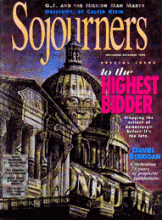It's amazing how quickly community develops in special circumstances. Recently the uniqueness of one man's last days served as catalyst for a true community, which, now that he has passed on, will cease to exist.
Don broke his neck as a 14-year-old and lived as a quadriplegic for half a century. Despite his disability he finished high school and college, did graduate work, and lived a productive, fulfilled life.
In the past year, Don's lungs began to fail, a series of infections weakened him, and he drew near death. A group of us gathered around Don, our unifying purpose to ease his dying process.
Foremost was an only niece, who had received constant nurture from her uncle after the premature death of her father, Don's brother. The almost palpable love between uncle and niece, as she nursed him through his final weeks, provided the glue for all who joined them during those days.
The attending physician, a longtime friend of Don's, gave of himself extensively during this period: daily visits to the sick man's home or the hospital; contact by phone in moments of crisis; and an extraordinary role in providing his patient with appropriate spiritual assistance near the end.
The good doctor asked if I would form part of this unique community as a minister of the gospel. Although Don claimed no particular Christian tradition, he was deeply spiritual and wanted the opinion of a priest regarding the appropriateness of turning off life-sustaining machines when these had become entirely artificial. The dying man's concern in this regard was very practical.
Read the Full Article
